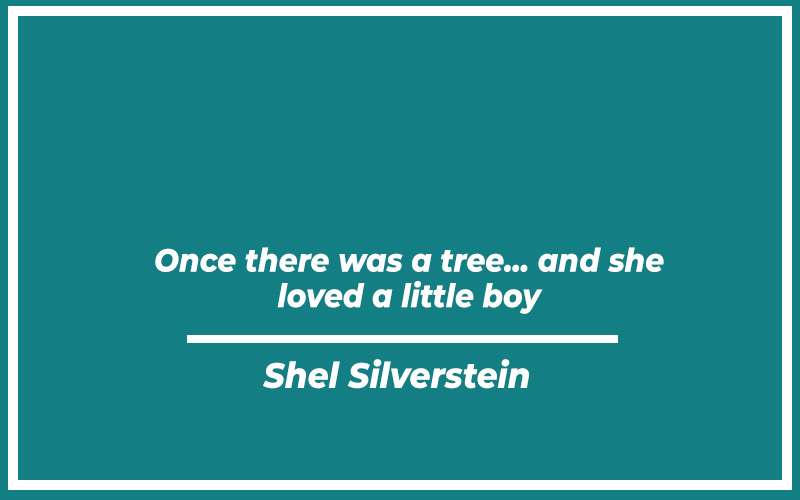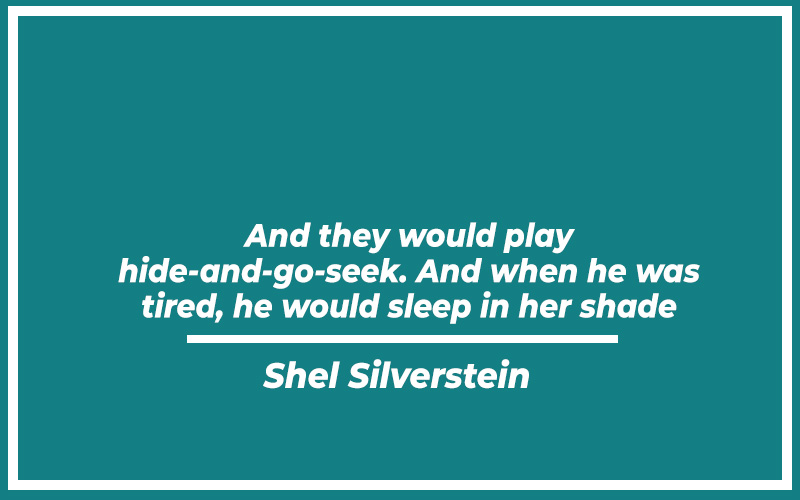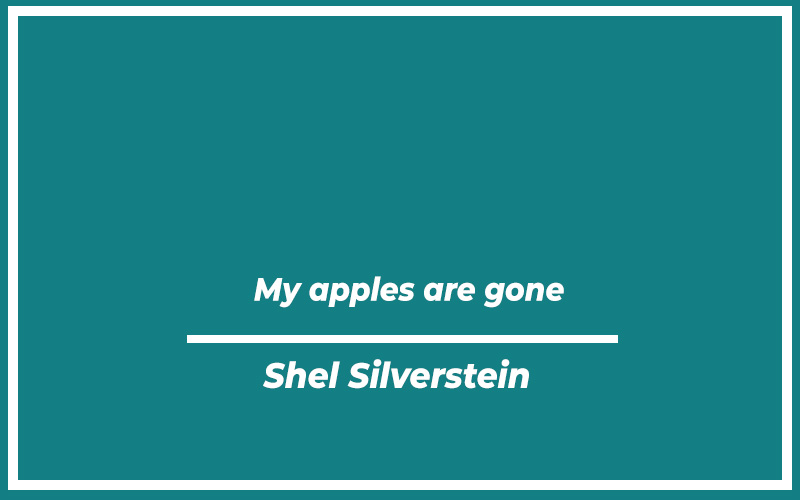The Giving Tree by Shel Silverstein is a simple story about a boy and a tree. As they both grow, the tree keeps giving parts of itself to make the boy happy—like its apples, branches, and even its trunk.
The quotes from the book really show these moments where the tree is giving everything it has.
They help you think about giving and taking in your own lives. They make you wonder how much you give to others and what you take from them.
The Giving Tree Quotes

“Once there was a tree… and she loved a little boy.” – Shel Silverstein
This quote sets the tone for The Giving Tree, illustrating the deep and selfless love the tree has for the boy. This love, akin to a parent’s for a child, is the foundation of the story.
The tree’s joy comes from giving everything to the boy, demonstrating a profound lesson in unconditional love and sacrifice. This narrative invites readers to reflect on the nature of giving and the pure joy found in making others happy, even at one’s own expense.
Also read: Calligraphy Quotes (with Explanation)
“And the boy loved the tree… very much. And the tree was happy.” – Shel Silverstein
Here, the mutual affection between the tree and the boy highlights a key aspect of their relationship: reciprocal love, though the boy’s needs often take precedence as he grows.
The phrase “and the tree was happy” recurs throughout the book, symbolizing the tree’s fulfillment and happiness in providing for the boy, regardless of the personal cost. This underscores a theme of joy derived from selfless giving.
“Come, Boy, come and climb up my trunk and swing from my branches and eat apples and play in my shade and be happy.” – Shel Silverstein
This invitation from the tree encapsulates its role as a provider of shelter, food, and happiness. It reflects the innocence and joy of childhood, where the simplest activities can bring happiness.
The tree continually offers all it has to ensure the boy’s happiness, embodying the ideal of selfless giving and nurturing.
“I am too big to climb and play,” said the boy. “I want to buy things and have fun. I want some money. Can you give me some money?” – Shel Silverstein
As the boy grows older, his desires change, reflecting a shift from the simplicity of childhood to the complex needs of adulthood. His request for money to buy happiness signifies a deeper societal commentary on materialism versus the simple joys of nature and relationships.
This moment also marks a turning point in their relationship, highlighting the boy’s increasing self-interest.
“I have only leaves and apples. Take my apples, Boy, and sell them in the city. Then you will have money and you will be happy.” – Shel Silverstein
This response from the tree shows its continuous effort to satisfy the boy’s evolving desires.
By suggesting he sell her apples, the tree still finds a way to provide for him, illustrating the theme of sacrifice and adaptation to loved ones’ needs. It reflects on how relationships can evolve, requiring changes in how one expresses love and care.
“Well,” said the tree, straightening herself up as much as she could, “well, an old stump is good for sitting and resting. Come, Boy, sit down. Sit down and rest.” And the boy did. And the tree was happy. – Shel Silverstein
In the story’s later stages, the tree, now reduced to a stump, still finds a way to be useful to the boy, now an old man.
This quote embodies the enduring nature of the tree’s love and support, regardless of how much it has given or what little it has left to offer. It’s a poignant reminder of enduring affection and the beauty of finding new ways to give within one’s means.
“And every day the boy would come and he would gather her leaves, make them into crowns and play king of the forest.” – Shel Silverstein
This quote recalls happier times when the boy would use the tree’s leaves to play and imagine, a representation of childhood’s innocence and creativity.
It serves as a nostalgic reflection on the past, suggesting that the memories and bonds formed in childhood carry a lasting impact, coloring our perceptions and relationships in adulthood.
“Come, Boy, sit down. Sit down and rest.” And the boy did. – Shel Silverstein
This quote from the tree in its final form as a stump, offering a place to rest, symbolizes the culmination of a lifetime of giving. Even in its last stages, the tree continues to provide comfort.
The simplicity of the act, just sitting and resting, emphasizes the profundity of true giving—offering what one can, no matter how small it seems. This moment captures the essence of enduring care and the quiet peace it can bring, reflecting a life well-lived through selflessness.
“And so the boy climbed up the tree and gathered her apples and carried them away. And the tree was happy.” – Shel Silverstein
This quote represents another phase in the boy’s life where he utilizes the tree’s resources for his own needs, this time taking the apples to perhaps sustain himself or earn a living.
The repeated phrase “And the tree was happy” underscores the tree’s unconditional love and satisfaction in the boy’s happiness, no matter the cost to itself. It reflects the self-sacrificing nature of love, often seen in parental relationships, where happiness is derived solely from the well-being of the loved one.
“Cut down my trunk and make a boat, then you can sail away… and be happy.” – Shel Silverstein
In this offering, the tree sacrifices its very structure, its trunk, for the boy’s new adventure. This quote is the pinnacle of self-sacrifice, as the tree gives up its essential form to ensure the boy’s happiness.
It symbolizes letting go, allowing loved ones to forge their own paths, even if it means losing them. This action illustrates a deep love that prioritizes another’s happiness and freedom above one’s own existence.
“And so the boy cut off her branches and carried them away to build his house. And the tree was happy.” – Shel Silverstein
The tree provides its branches so the boy can build a house, representing yet another stage of giving. Each act of giving aligns with the boy’s changing needs through different life stages.
The tree’s happiness, repeated throughout the story, signifies its fulfillment through selfless acts. This aspect of the narrative explores the depth of sacrifice one can make for love, highlighting how.
“I don’t need very much now,” said the boy. – Shel Silverstein
In this mature statement, the boy reflects on his diminished needs, signifying a shift towards introspection and realization of what truly matters in life. This line illustrates the evolution of desires, from youthful materialism to an older, more reflective state where emotional and simple physical comforts take precedence.
It highlights the journey towards understanding the essence of happiness, not found in abundant possessions but in simple, meaningful interactions and the peace they bring.

“And they would play hide-and-go-seek. And when he was tired, he would sleep in her shade.” – Shel Silverstein
This quote brings us back to the innocent and joyful interactions between the boy and the tree during his childhood. It captures the essence of carefree play and the comfort of resting in a familiar, safe space.
The tree serves not just as a playmate but as a guardian and shelter, reinforcing the themes of safety and unconditional support that are pivotal in nurturing environments. This relationship models how foundational and comforting consistent, loving relationships are for personal development.
“‘I am too old and sad to play,’ said the tree.” – Shel Silverstein
This poignant moment reflects the tree’s weariness and sadness, a stark contrast to its once vibrant and giving nature. It speaks to the inevitability of aging and change, and the sadness that can accompany the loss of function or purpose.
This quote invites readers to consider the emotional depth of those who give tirelessly, often at the expense of their own joy and vitality, and the complex feelings that arise when one can no longer give as before.
“And so the tree was happy… But not really.” – Shel Silverstein
This line offers a deeper, somewhat melancholic twist to the tree’s repeated happiness. It suggests that the tree’s joy is complex, mixed with an underlying sense of loss or sacrifice that isn’t fully reconciled.
This acknowledgment of nuanced emotions introduces a realistic element to the narrative, acknowledging that selflessness, while noble, often comes with personal costs that can affect one’s well-being and happiness.
“‘Come, Boy,’ she whispered, ‘come and play.'” – Shel Silverstein
Even as the tree becomes older and has less to offer in physical terms, it still invites the boy to play, highlighting the enduring nature of their bond.
This invitation is tender and nostalgic, reflecting the tree’s desire to relive past moments of joy and connection. It underscores the deep emotional bonds that can persist even when the physical aspects of a relationship have changed or diminished.
“‘I want some money,’ said the boy. ‘Can you give me some money?'” – Shel Silverstein
This quote starkly illustrates the boy’s shift from the joys of simple play to more adult concerns centered around material needs. It marks a pivotal moment in the narrative where the relationship’s dynamic changes, highlighting the often inevitable materialistic desires that come with growing up.
This phase in the boy’s life reflects broader societal values on success and happiness, often measured by financial stability or material possessions.
“If you want a house, you may cut off my branches, my boy,” said the tree. – Shel Silverstein
The tree’s offer to the boy to cut off its branches so he can build a house is yet another profound moment of self-sacrifice. It highlights the lengths to which the tree will go to ensure the boy’s happiness and stability, even at great personal cost.
This quote explores the themes of sacrifice and unconditional love, illustrating how true care often involves making tough decisions that prioritize the well-being of others over oneself.
“Can you give me a boat?” – Shel Silverstein
This direct request from the boy for a boat encapsulates his continued reliance on the tree for fulfilling his desires.
It highlights the one-sided nature of their relationship and the ongoing expectation for the tree to provide, despite its dwindling resources.
“Cut down my trunk and make a boat.” – Shel Silverstein
The tree’s willingness to offer its trunk for the boy to build a boat is its final and most significant act of sacrifice.
This gesture is a profound testament to the tree’s unconditional love and highlights the ultimate cost of giving everything for someone else’s happiness.
“Then you will be happy.” – Shel Silverstein
The tree’s final wish for the boy’s happiness, even at the cost of its own life, encapsulates the central theme of the story: the hope that our sacrifices will lead to happiness for those we love.
It reflects on the nature of happiness and questions whether it can truly be achieved through such profound sacrifice.
“I have no house.” – Shel Silverstein
This response by the tree, highlighting its limitations, brings to light the boundaries of what one can give.
It addresses the reality that even the most generous givers have limits, and these boundaries must be respected to maintain a healthy, sustainable relationship.
“The forest is my house.” – Shel Silverstein
By identifying the forest as its house, the tree expresses its intrinsic connection to nature and its fundamental needs, which are starkly different from the boy’s.
This line contrasts the simplicity of the tree’s needs with the complexity of human desires, emphasizing a return to basic, natural living as a form of contentment.
“You may cut down my branches and build a house.” – Shel Silverstein
This permission from the tree allows the boy to build a house from its branches, illustrating another layer of sacrifice.
It highlights the tree’s willingness to give up part of itself to provide the boy security, reflecting the themes of self-sacrifice and the lengths to which one might go to support loved ones.
“My teeth are too weak for apples.” – Shel Silverstein
This acknowledgment by the now older boy highlights the physical limitations that come with aging, reflecting the changes in needs and abilities over time.
It suggests a shift in the relationship dynamic, where past sources of joy and sustenance are no longer suitable or sufficient, pointing to the broader themes of adaptation and acceptance.
“Can you give me a house?” – Shel Silverstein
The boy’s request for a house from the tree indicates a significant shift in his needs from transient to permanent, reflecting his life’s progression into stability and adulthood.
This query explores the expectations placed on caregivers and the pressures they face to continually provide, often at great personal sacrifice.
“I am too old to swing on branches.” – Shel Silverstein
This reflection by the boy on his inability to engage in past joys due to aging speaks to the bittersweet nature of revisiting childhood places or relationships as an adult.
It emphasizes the universal experience of aging and the loss of youthful vigor, underscoring the inevitability of change and the nostalgic longing for simpler times.

“My apples are gone.” – Shel Silverstein
When the tree states that it no longer has apples, it symbolizes depletion—both physically and metaphorically.
This line speaks to the consequences of continual giving without replenishment, illustrating the natural limits of generosity and the importance of sustainable relationships where giving and receiving are balanced.
Also read: Ride or Die Quotes (with Explanation)
Final Thoughts
The quotes from “The Giving Tree” by Shel Silverstein make you think about how much you give to others and what it means to really love someone. They show that giving can make you happy but sometimes it’s hard when you give a lot.
These quotes help you look at your own life and how you treat people close to you. They teach a simple but important lesson about caring and sharing.

